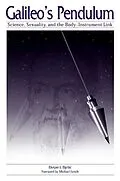Drawing on the theories of Michel Foucault, Judith Butler, and others who have written on the history of sexuality and the body, Galileo's Pendulum explores how the emergence of the scientific method in the seventeenth century led to a de-emphasis on the body and sexuality. The first half of the book focuses on the historical modeling of the relation between pleasure and knowledge by examining a history of scientific rationality and its relation to the formation of the modern scientist's subjectivity. Relying on Foucault's history of sexuality, the author hypothesizes that Galileo's pendulum, as an extension of mathematics and the body, must have been sexualized by schemes of historical representation to the same extent that such schemes were rationalized by Galileo. The second half of the book explores the problems of scientific methodology and attempts to return the body in an explicit way to scientific practice. Ultimately, Galileo's Pendulum offers a discursive method and praxis for resexualizing the history of Galilean science.
Autorentext
Dusûan I. BjelicOE is Associate Professor of Sociology at the University of Southern Maine and the coeditor (with Obrad SavicOE) of Balkan as Metaphor: Between Globalization and Fragmentation.
Klappentext
Examines the history of science in light of recent theories of sexuality and the body.
Drawing on the theories of Michel Foucault, Judith Butler, and others who have written on the history of sexuality and the body, Galileo's Pendulum explores how the emergence of the scientific method in the seventeenth century led to a de-emphasis on the body and sexuality. The first half of the book focuses on the historical modeling of the relation between pleasure and knowledge by examining a history of scientific rationality and its relation to the formation of the modern scientist's subjectivity. Relying on Foucault's history of sexuality, the author hypothesizes that Galileo's pendulum, as an extension of mathematics and the body, must have been sexualized by schemes of historical representation to the same extent that such schemes were rationalized by Galileo. The second half of the book explores the problems of scientific methodology and attempts to return the body in an explicit way to scientific practice. Ultimately, Galileo's Pendulum offers a discursive method and praxis for resexualizing the history of Galilean science.
Dusûan I. BjelicOE is Associate Professor of Sociology at the University of Southern Maine and the coeditor (with Obrad SavicOE) of Balkan as Metaphor: Between Globalization and Fragmentation.
